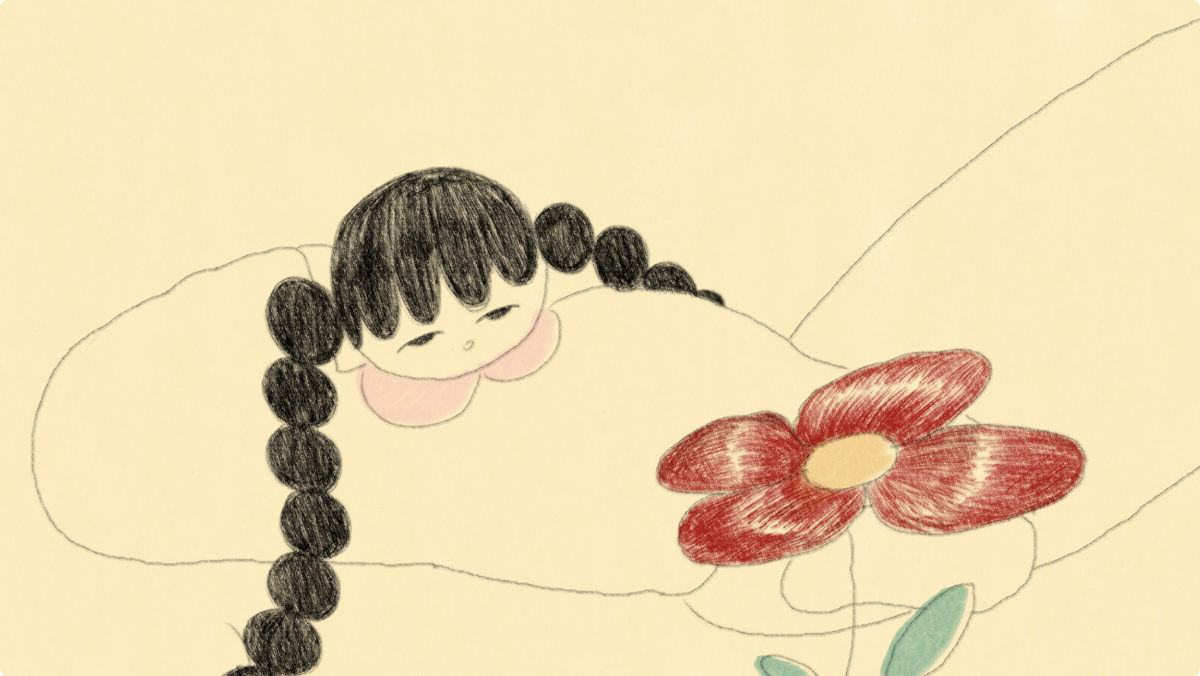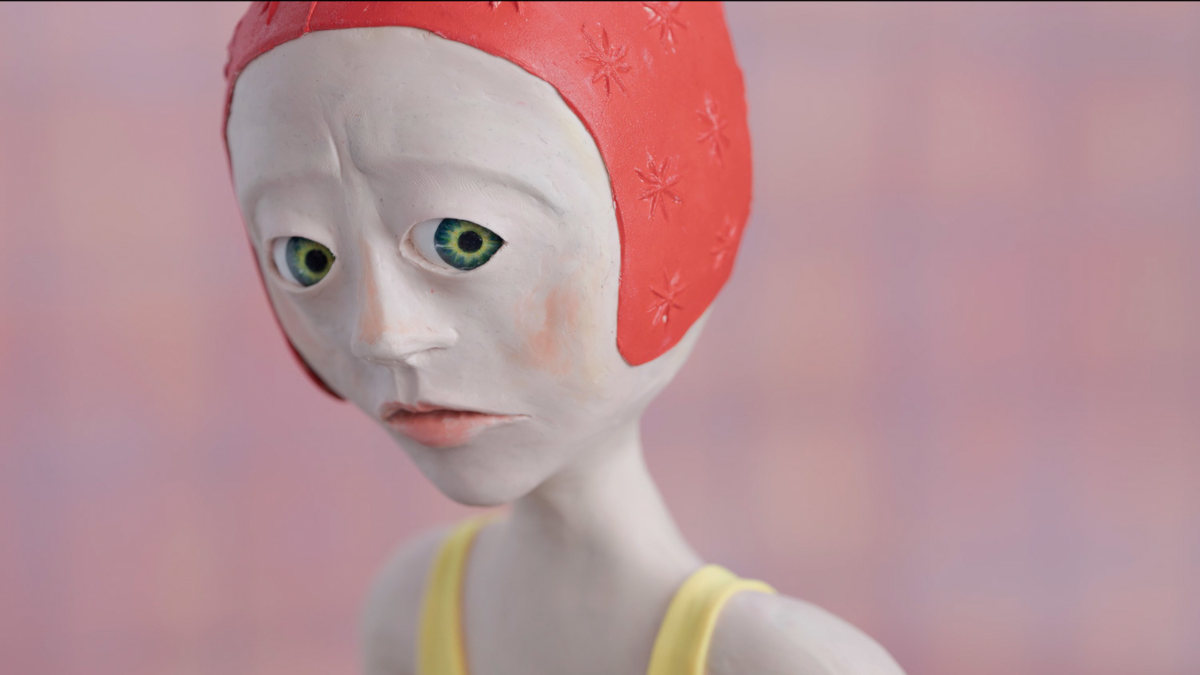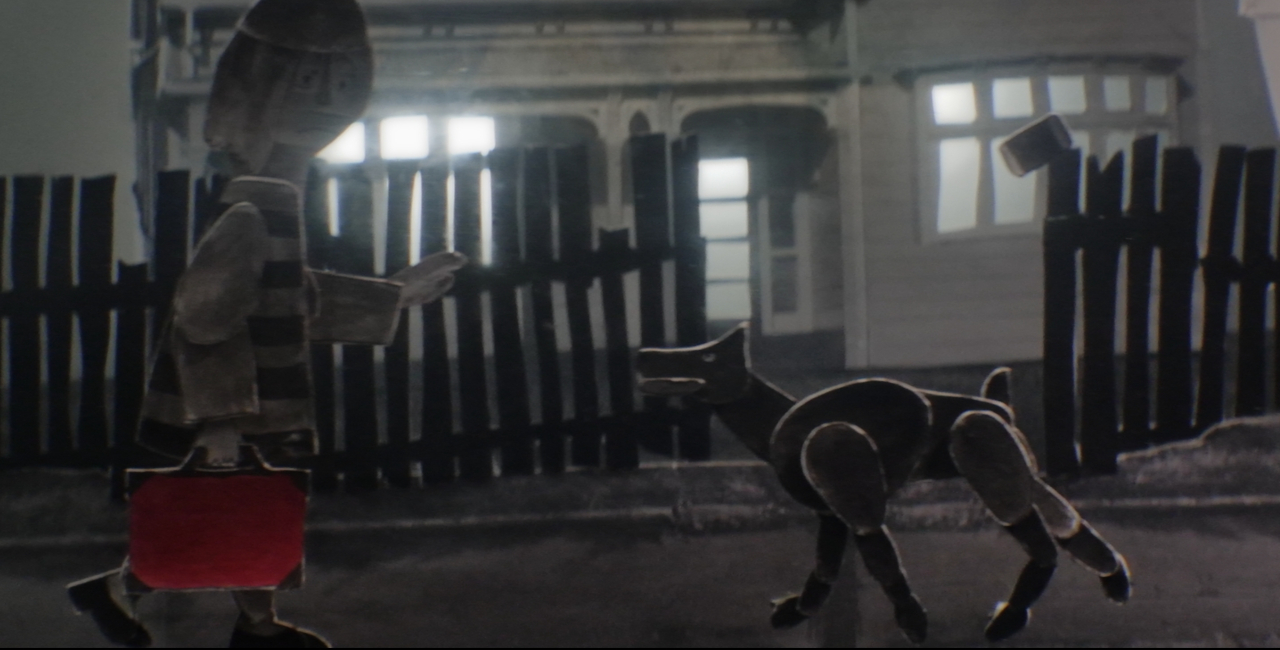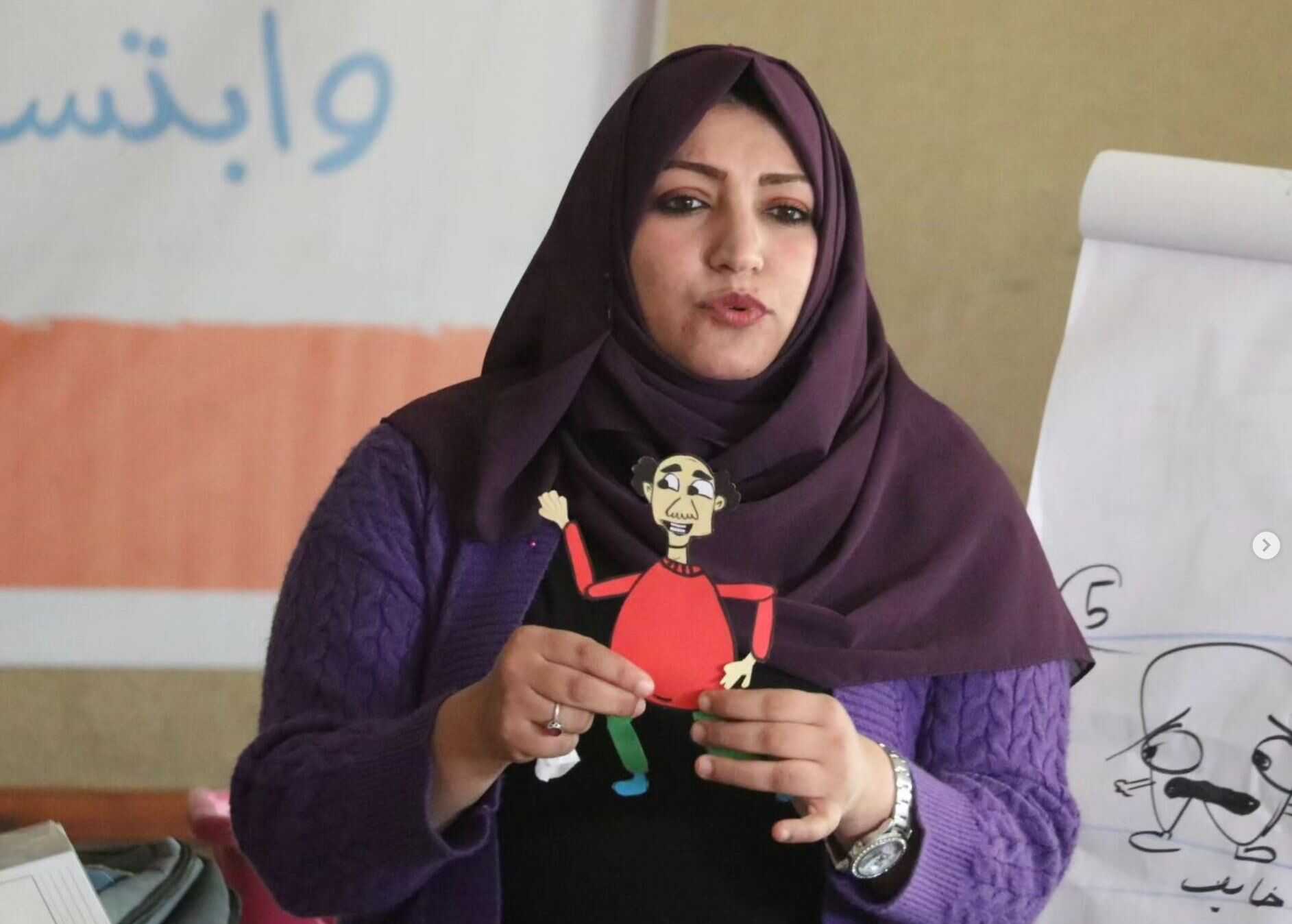Tulpa by Paris Baillie
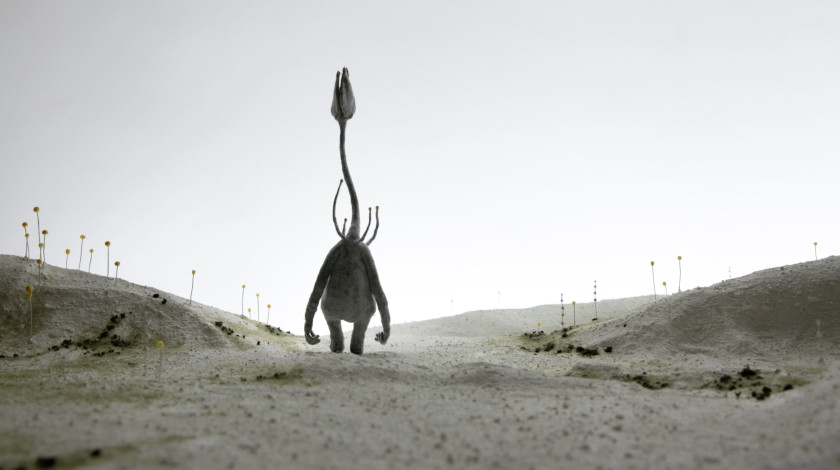
Forms of Tibetan Buddhism and other traditions have introduced the concept of 'tulpa', a being or thought-form materialized, which is a result of spiritual practice and meditation. This is the topic of the new animation short 'Tulpa' by US director Paris Baillie (whose recent film 'Humantis' premiered at the 2024 Annecy Film Festival).
'Tulpa' is also a animation documentary of sorts, with the director asking testimony from her parents about their own experience with creating tulpas. Their narration found their way to the finished, stop-motion short. We asked Paris Baillie her thoughts about the film, now released online.
ZF: Tulpa is a materialized being or a thought form and the result of meditation practice according to Tibetan Buddhism. Can you expand on what exactly Tulpa is to you?
PB: I created this tall, lanky, plump-bellied creature while I was in college to represent myself in my artwork. It felt easier to use this character instead of humans to express my feelings or tell stories. I’ve tried HypnoTherapy before, and when I was asked to envision 'my most expanded self' to talk to in meditation I always pictured my Tulpa character. This character spiritually represents a version of myself that I aim to be - someone who is very calm, patient, understanding, and has a big heart. I think I was listening to a This American Life podcast episode when I was first introduced to the concept of Tulpas. After doing some more research about this Buddhist practice I felt that the concept related to how I therapeutically use my characters in my work.
ZF: The film is the outcome of recorded interviews with your family members about Tulpa. How did you come about this idea of making the film about this and using interviews as material?
PB: Before this film, my Tulpa characters only existed two-dimensionally in my paintings. I wanted to use this film as a chance to explain what they are, but I thought it would be more interesting to share my process by also including my family and experiment with making Tulpas for them. I recorded conversations with my parents and sister separately, where they asked me questions about my Tulpa and then I asked them questions that I felt would best inform what theirs could be. I spent a lot of time listening to the interviews with my family and used that as inspiration to design the Tulpas and their environments.
ZF: If I'm right, this was your first professional attempt at animation. How did you decide about the final puppet look, the material used, and the sequences you wanted to animate?
PB: My first stop motion short, 'Cave,' was a very basic claymation I made in college. 'Cave' is about a version of myself finding a magical cave filled with lanky white creatures and then I turn into one of them. Seems fitting, right? 'Tulpa' is definitely more of a professional attempt at making a short stop motion film. I was a graduate student at CalArts in Experimental Animation when I made this film, and I learned so much from Stephen Chiodo’s puppet fabrication and performance classes. Designing the Tulpa characters for my family took some time, but it was an interesting challenge to stay true to what they would want their Tulpas to be even though it was still my own interpretation. Some of the materials I used to make the puppets are aluminum wire, epoxy, latex, foam and flocking powder for the soft texture. I spent a lot of time on the lighting of the film, and wanted this strange white sky to connect all of the different Tulpa worlds. The scale of this short was much larger than 'Cave,' and I had a lot of fun animating this world in a way that related to the recorded interviews.
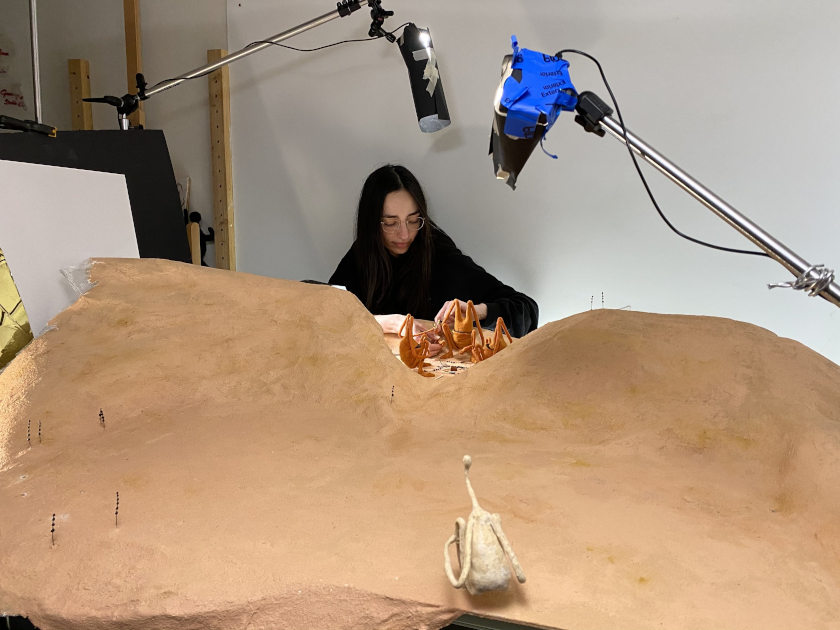
Paris Baillie working on 'Tulpa'
ZF: Relatedly, what kind of difficulties have you had to face? The film was made during the COVID-19 lockdown, and it's a student film.
PB: Even though this is my first film done in grad school, I made it alone at home during COVID lockdown. It was obviously a surreal time for a lot of people, so I wanted to make a film that felt comforting. I’m pretty proud for making the most of what I had at home to make this film, but it was a challenging learning experience. All of my classes and critiques were done online - It was an isolating time, but it felt good to have this film to focus on.
ZF: You also did the sound edit and mix of the film. Was it something you did as a kind of practice? Would you delegate if needed?
PB: The original interviews with my mom, dad, and sister are hours long - so there was a lot of editing. I tried to include what felt most important or relevant to the Tulpas on screen, but there were a lot of other conversations that helped inform the design of their characters that didn’t make it into the final edit. This was my first time doing the sound design for my own animations, and I really enjoyed the process and learned a lot. There were a lot of 'firsts' for me making this film, and I was excited to challenge myself.
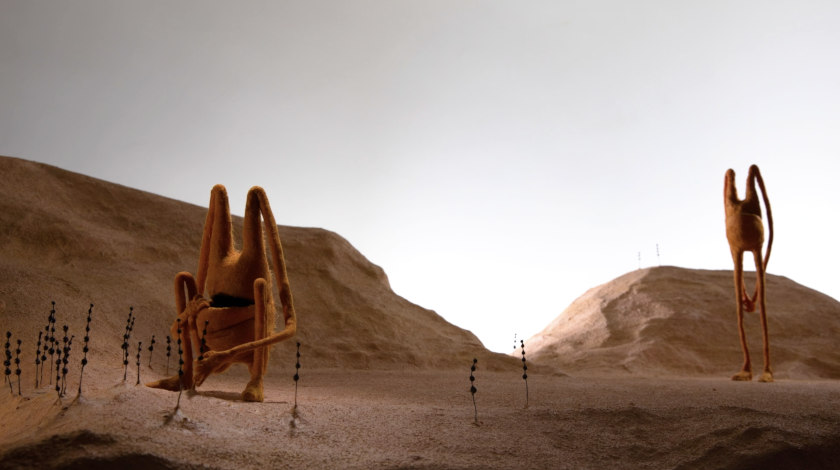
ZF: Making a film with a personal feel is helpful (you know your subject) but can also be tricky -you cannot distance yourself. Did you feel that pressure while making the film?
PB: When I stepped back and watched the finished film for the first time I thought, 'Oh my… did I just expose a vulnerable side of myself, AND my family?!' I certainly felt pressure to distance myself from it, but it was hard at first to share it with other people. I’m protective of my Tulpa and my family, so I wanted to make them proud. COVID was a strange and vulnerable time for me, so I feel like I couldn’t help but make something personal and therapeutic.
ZF: What do you want the audience to take with them when watching Tulpa? And what are your next steps?
PB: I hope it helps people feel less alone, and maybe inspire them to invent their own kind of Tulpa character! Or maybe it inspires someone to try stop motion animation for the first time! Making this short film confirmed my interest in becoming a stop motion animator. My latest short film is called 'Humantis', and it premiered at Annecy International Animation Festival in June 2024. 'Humantis' is about these human + flower mantis creatures that are masters of deception (watch the trailer). Yet, one Humantis struggles to adapt and grow into a new physical transformation.
Watch 'Tulpa' by Paris Baillie:
About Paris Baillie:
Paris Baillie is an artist and animator from Los Angeles. Her childhood dreams of being a Broadway star, and teenage years of experimenting with photography and taking dance has influenced her animation practice. Paris is obsessed with stop motion animation, and enjoys the control and playing god. Paris directs and animates short films that focus on her community of fabricated characters and their own worlds. In 2017, Paris graduated from Skidmore college with a BS Degree in Studio Art, concentrating in painting and digital media. She then earned a MFA in Experimental Animation at CalArts in 2023, and was a recipient of the Jules Engel scholarship. Her short film, Tulpa, has shown at Atlanta Shortsfest, #MoStopMo Shorts festival, Cannes Short Film Festival, NYShorts International Film Festival, and won the award for best animation at Brooklyn Film Festival in 2023. Paris’ most recent film, 'Humantis,' premiered at Annecy Animation Festival in the graduation film section in June 2024, as well as AFI Fest, Flicker’s Rhode Island Film Festival, and the London International Animation Film Festival. Paris is currently working on developing her next short film, which has been supported so far by the artist residency, Yaddo.




